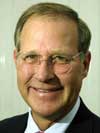
Will Bush work with Democrats? He did back in Austin
COMMENTARY | November 320, 2006
Bush got along with Democrats when he was governor of Texas; maybe dropping Rumsfeld and, possibly, getting off Cheney’s lap are signals he’s preparing to try a little bipartisanship in Washington.
By Dave McNeely
dmcneely@austin.rr.com
AUSTIN—Bipartisanship – (noun) – An archaic custom in which elected officials from two opposing political parties actually cooperate. In recent years, as rare in Washington as sightings of the Ivory-Billed Woodpecker. Last seen in Texas.
In the last century, back when George W. Bush became governor of Texas, he learned to practice an odd local custom.
Bush, a Republican who had unseated popular Democratic Gov. Ann Richards, was told that in the Texas capitol, "relationships are everything." He was coached to build strong and warm relationships with the leaders of the Texas House and Senate, Speaker Pete Laney and Lt. Gov. Bob Bullock, their top aides, and also legislators.
A few weeks before the 1994 election, amid signs he was going to win, Bush asked to meet with Bullock, and went to Bullock's house.
After Bush left, Bullock, a control freak whose relationship with Richards had badly deteriorated in the previous four years, told his chief of staff, "I believe we can work with that boy."
And he did, and so did Laney. Bush was smart enough to know that if he hoped to get passed even the modest proposals that he had made, his success was at the mercy of the Democrat-dominated Legislature. The Democratic leaders, whose bodies were growing more Republican, also had a vested interest in a friendly relationship with the top Republican.
And warm friendships grew. Bush fed Bullock's craving for information and detail control, to the point that Bullock endorsed Bush for re-election in 1998 over Bullock's own political protégée, Land Commissioner Garry Mauro. And he also endorsed Bush for president.
Bullock died in June of 1999, before Bush won his party's nomination or the White House. But Bush honored Bullock's request and delivered the late lieutenant governor's eulogy. After Bush claimed the GOP nomination in 2000, he called on Bullock's widow Jan to introduce him at the Republican National Convention.
When the United States Supreme Court finally declared Bush the winner of the 2000 presidential race weeks after the election, Bush was introduced to the nation as the next president from the floor of the Texas House of Representatives – by Speaker Laney. Matthew Dowd, a polling expert who was a consultant to Bullock in his 1990 and 1994 elections, said he went to work for Bush after seeing him reach across party lines to work with Bullock.
But even though Bush said he wanted to take the bipartisanship model to Washington, it never got off the ground – partly because his own party's congressional leaders, like former House Majority Leader Tom DeLay, were much less interested in working with Democrats than in destroying them.
Bush's political guru Karl Rove, who had engineered Bush's election victory, also was determined to build a Republican majority that would endure for decades. To pad the Republicans' narrow margin in the U.S. House, DeLay engineered congressional re-redistricting in Texas in 2003 to unseat six Texas Democrats. In Washington, Bush did not find the chauvinism of Democratic Texas legislators, who felt that if a Republican were to be president, he might as well be from Texas. Inside the Beltway, the awe for a president was in short supply. Many members of Congress thought they were more qualified than Bush was for the job, and several were interested in seeking it.
Jettisoning the cantankerous, bullheaded Donald Rumsfeld as secretary of defense is one large step. While Bush's vice president, Dick Cheney, has been a Rumsfeld protégé for most of his adult life, sidelining Rumsfeld may indicate Bush is stepping down from Cheney's lap.
It seems hard to believe that since the 2004 election, Republican Congressmen Duke Cunningham of California, Robert Ney of Ohio, DeLay of Texas and Mark Foley of Florida have resigned from Congress amid scandals, and the Democrats are suddenly in control.
While President Bush is making nice with the Democratic leaders and vice versa, a reminder to the 49 Senate Democrats, who are depending on Independents Bernie Sanders of Vermont and Joe Lieberman of Connecticut to organize with them to reach a majority: treat those guys very, very nice.
|
|
Dave McNeely, a 1976 Nieman Fellow, is a veteran Texas political reporter and columnist. 
E-mail: davemcneely111@yahoo.com
|




